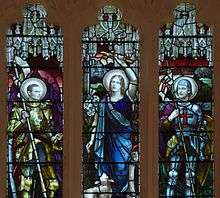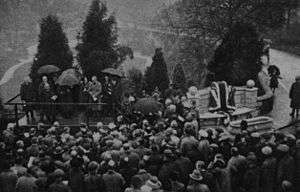Thomas Agar-Robartes

Thomas Charles Reginald Agar-Robartes (known as Tommy) (22 May 1880 – 30 September 1915) was a British Liberal politician.
Background and education
Tommy Agar-Robartes was the eldest son and heir of Thomas Agar-Robartes, 6th Viscount Clifden, and his wife Mary (née Dickenson) and was brought up at Lanhydrock House, Bodmin. He was the eldest of ten (including a twin sister).[1] Educated at Oxford and a keen horseman, he played in the Oxford University polo team that beat Cambridge in 1903.[2]

Public life
He was elected a Member of Parliament for Bodmin in the 1906 general election, but lost his seat in June 1906 following a controversial election petition by the defeated candidate alleging illegal payments to potential voters. He was elected to the St Austell Division of Cornwall in a by-election in 1908 and held the seat until his death.
Military career
He was commissioned a second lieutenant in the Royal 1st Devon Imperial Yeomanry on 4 June 1902.[3] At the outbreak of World War I he joined the Royal Bucks Hussars as an officer. Tommy then joined the Coldstream Guards and was subsequently posted to France & Flanders. Captain The Honourable Thomas Charles Reginald Agar-Robartes, in command of No. 2 Coy, 1st Bn, the Coldstream Guards, was wounded in the Battle of Loos on 28 September and killed by a sniper on 30 September 1915 after rescuing a wounded comrade under heavy fire for which he was recommended for the Victoria Cross.
He is buried in Lapugnoy Military Cemetery, near Béthune.[4] He is commemorated by a memorial in Truro Cathedral[5] and in stained glass at Selsey Abbey, Wimpole[6] and Church Norton.[7]

Agar-Robartes is commemorated on Panel 8 of the Parliamentary War Memorial in Westminster Hall, one of 22 MPs who died during World War I to be named on that memorial.[8][9] Agar-Robartes is one of 19 MPs who fell in the war who are commemorated by heraldic shields in the Commons Chamber.[10] A further act of commemoration came with the unveiling in 1932 of a manuscript-style illuminated book of remembrance for the House of Commons, which included a short biographical account of the life and death of Agar-Robartes.[11][12] His younger brother Francis later succeeded their father in the viscountcy.
Notes
- ↑ "Births, Marriages, Deaths". The Cornishman (99). 3 June 1880. p. 8.
- ↑ "The Polo Monthly" (PDF). 19 January 1911: 334. Retrieved 16 October 2015.
- ↑ "No. 27439". The London Gazette. 3 June 1902. p. 3611.
- ↑ "Casualty Details: Agar-Robartes, The Hon. Thomas Charles R.". Commonwealth War Graves Commission. Retrieved 30 August 2016.
- ↑ http://ww1cemeteries.com/british_cemeteries_memorials/agar_robartes_mem_truro.htm
- ↑ Wimpole Parish Church at www.wimpole.info
- ↑ West Sussex County Council: Heritage at victorians.westsussex.gov.uk
- ↑ "Recording Angel memorial Panel 8". Recording Angel memorial, Westminster Hall. UK Parliament (www.parliament.uk). Retrieved 31 August 2016.
- ↑ "List of names on the Recording Angel memorial, Westminster Hall" (pdf). Recording Angel memorial, Westminster Hall. UK Parliament (www.parliament.uk). Retrieved 31 August 2016.
- ↑ "Agar-Robartes". Heraldic shields to MPs, First World War. UK Parliament (www.parliament.uk). Retrieved 31 August 2016.
- ↑ "House of Commons War Memorial: Final Volumes Unveiled by The Speaker". The Times (46050). London. 6 February 1932. p. 7.
- ↑ Moss-Blundell, Edward Whitaker, ed. (1931). The House of Commons Book of Remembrance 1914–1918. E. Mathews & Marrot.
References
- Leigh Rayment's Historical List of MPs
- Lundy, Darryl. "FAQ". The Peerage.
- Wimpole War Memorial
External links
| Parliament of the United Kingdom | ||
|---|---|---|
| Preceded by Sir Lewis Molesworth |
Member of Parliament for Bodmin 1906–1906 |
Succeeded by Freeman Freeman-Thomas |
| Preceded by William Alexander McArthur |
Member of Parliament for St Austell 1908–1915 |
Succeeded by Sir Francis Layland-Barratt |